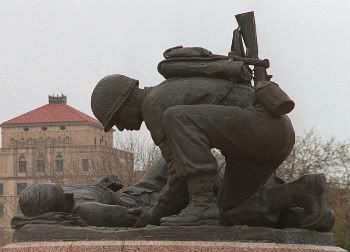Saturday, August 28, 2010
Tuesday, August 24, 2010
Whitefield preaches the Gospel
It's longer than most quotes I post but I think it's worth reading...
Abraham was God's creature (and God was Abraham's friend) and therefore under the highest obligation to surrender up his Isaac. But O stupendous love! Whilst we were his enemies, God sent forth his Son, made of a woman, made under the law, that he might become a curse for us. O the freeness, as well as the infinity, of the love of God our Father! It is unsearchable: I am lost in contemplating it; it is past finding out. Think, O believers, think of the love of God, in giving Jesus Christ to be a propitiation for our sins. And when you hear how Abraham built an altar, and laid the wood in order, and bound Isaac his son, and laid him on the altar upon the wood; think how your heavenly Father bound Jesus Christ his only Son, and offered him upon the altar of his justice, and laid upon him the iniquities of us all.
When you read of Abraham's stretching forth his hand to slay his son, Think, O think, how God actually suffered his Son to be slain, that we might live for evermore. Do you read of Isaac carrying the wood upon his shoulders, upon which he was to be offered? Let this lead you to mount Calvary (this very mount of Moriah where Isaac was offered, as some think) and take a view of the antitype Jesus Christ, the Son of God, bearing and ready to sink under the weight of that cross, on which he was to hang for us. Do you admire Isaac so freely consenting to die, though a creature, and therefore obliged to go when God called? O do not forget to admire infinitely more the dear Lord Jesus, that promised seed, who willingly said, “Lo, I come,” though under no obligation so to do, “to do thy will,” to obey and die for men, “O God!” Did you weep just now, when I bid you fancy you saw the altar, and the wood laid in order, and Isaac laid bound on the altar? Look by faith, behold the blessed Jesus, our all-glorious Emmanuel, not bound, but nailed on an accursed tree: see how he hangs crowned with thorns, and had in derision of all that are round about him: see how the thorns pierce him, and how the blood in purple streams trickle down his sacred temples! Hark how the God of nature groans! See how he bows his head, and at length humanity gives up the ghost! Isaac is saved, but Jesus, the God of Isaac, dies; A ram is offered up in Isaac's room, but Jesus has no substitute; Jesus must bleed, Jesus must die; God the Father provided this Lamb for himself from all eternity. He must be offered in time, or man must be damned for evermore. And now, where are your tears? Shall I say, refrain your voice from weeping? No; rather let me exhort you to look to him whom you have pierced, and mourn, as a woman mourneth for her first-born: for we have been the betrayers, we have been the murderers of this Lord of glory; and shall we not bewail those sins, which brought the blessed Jesus to the accursed tree? Having so much done, so much suffered for us, so much forgiven, shall we not love much! O! let us love Him with all our hearts, and minds, and strength, and glorify him in our souls and bodies, for they are his.
- George Whitefield from his sermon Abraham's Offering Up His Son Isaac
Wednesday, August 18, 2010
Be content with your wages

Friday, August 13, 2010
Batter my heart
Surfing the blogosphere this morning I saw a familiar poem posted over at Titusonenine. When I lived in the dorms at Asbury Seminary a roommate of mine had this poem tacked up above his bed. I was impressed by its wisdom then and am still impressed by it today...
Batter my heart, three-person'd God, for you
As yet but knock, breathe, shine, and seek to mend;
That I may rise and stand, o'erthrow me, and bend
Your force to break, blow, burn, and make me new.
I, like an usurp'd town to'another due,
Labor to'admit you, but oh, to no end;
Reason, your viceroy in me, me should defend,
But is captiv'd, and proves weak or untrue.
Yet dearly'I love you, and would be lov'd fain,
But am betroth'd unto your enemy;
Divorce me,'untie or break that knot again,
Take me to you, imprison me, for I,
Except you'enthrall me, never shall be free,
Nor ever chaste, except you ravish me.
-John Donne
Saturday, August 7, 2010
Olympic


Friday, August 6, 2010
Veritas
Truth, then, in its simplest dimension, is a judgment which corresponds to things as they actually are. . . . This definition of truth, however, is deficient from the Christian point of view, for it does not link truth with the mind of God sharply enough. For the Christian, God is truth because He is the Author of all facts and meaning. There is no reality apart from the eternal nature of God Himself and the universe which He has created to display His glory. . . . Since the mind of God perfectly knows reality, truth is a property of that judgment which coincides with the mind of God. . . . Truth for the Christian, then, is defined as correspondence with the mind of God. On any level of judgment, therefore, man has truth only as long as he says about facts what God says about these facts.-Edward J. Carnell, An Introduction to Christian Apologetics: A Philosophic Defense of the Trinitarian-Theistic Faith
Sunday, August 1, 2010
Mars Hill




